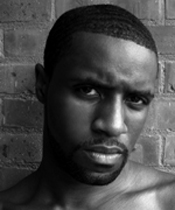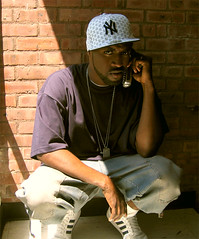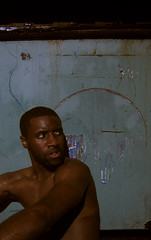on hip-hop, hoes and bitch-ass-niggas
My opening remarks from the panel discussion I organized in February -- Hip-Hop and Homophobia: Exploring Masculinity, Bisexuality and the DL.
Panelists:
Professor Cornel West
Lynne D. Johnson, hip-hop journalist
Shante Paradigm, hip-hop artist and scholar
Dr. David Malebranche, physician and HIV/AIDS researcher

When grappling with the question of how to frame a discussion about the curious construction of masculinity within hip-hop culture, two phrases echoed in my mind. Two epithets, really, existing in two different moments in hip-hop history that managed (if only in my mind) to resonate and dialogue with one another.
The first, I owe to the lyrical genius of Snoop Doggy Dog. I’d pin it down to the mid 90s when Snoop was to Dr Dre what Eminem is now to Dr Dre. The phrase is: “Bitches aint shit but hoes and tricks”. I couldn’t have been older than 13 years old when that lyrical masterpiece hit the airwaves, but I can still remember the rhythm of the words played in a constant loop in the tape deck of the historical moment. Bitches ain't shit but hoes and tricks. The second is a more recent utterance. It wasn’t as singularly articulated in a stand-out radio single, but nonetheless emblematic of a pervasive sentiment in hip-hop culture. I’d attribute it to Cam’ron circa 2004. The phrase is “no homo”.
The second is a more recent utterance. It wasn’t as singularly articulated in a stand-out radio single, but nonetheless emblematic of a pervasive sentiment in hip-hop culture. I’d attribute it to Cam’ron circa 2004. The phrase is “no homo”.
By a show of hands – who here knows what “no homo” means?
It’s a disclaimer meaning nothing homosexual or homoerotic is intended by the following or aforementioned phrase.
Examples:
-- biggie’s flow is so hot, I could listen to him spit all night – no homo.
-- my crew is ride or die. I would do anything for them – no homo.
The phrase has this uncanny duality. On one hand, it serves as a prohibition. Through sheer repetition, it emphasizes that not only are homos emphatically “not allowed” in the physical or discursive space, but even the mere notion that one might interpret an happenchance word pairing as some queer pun or gay double-entendre must be acknowledged and cancelled. On the other hand, it forces all present to return to what’s been said and to draw upon their lexicon of homoeroticism and gay sex acts just so they can understand why the speaker has invoked the phrase in the first place. On one hand, the term protests the existence and the trace of homosexuality. On the other, it makes homoerotics a mainstay in the playful banter of otherwise straight men and women.
No homo made me think. What is it about the way in which masculinity is being constructed and replicated within hip-hop culture that makes homosexuality and homoeroticsm so repulsive, yet alluring? Why have the sissy, the fag, bitch-ass-nigga and the homo been such indispensable icons in hip-hop culture? And, more importantly, where do these images appear most frequently?
Is it the case that rappers consistently speak out about homosexuality, itself, or is there more going on? Is there a broader campaign against bitch-ness and bitch-like qualities? Why is it that in a rap battle, the most potent jabs at one’s opponent are lines that feminize him or call his masculinity into question? What is so dangerous or repulsive or frightening about the effeminate male, and why is it problematic to use femininity as a proxy for sexuality? Does hip-hop have a problem with women? The popularity of the line “Bitches ain’t shit but hoes and tricks” suggests that the answer might be yes. But what do we make of the fact that another of the highest insults in a rap battle or a game of the dozens is an insult to one’s mother? How can the culture condition hip-hoppers to protect and promote the character of their mother in one breath, but normalize the utter degradation of all females in the next?
Does hip-hop have a problem with women? The popularity of the line “Bitches ain’t shit but hoes and tricks” suggests that the answer might be yes. But what do we make of the fact that another of the highest insults in a rap battle or a game of the dozens is an insult to one’s mother? How can the culture condition hip-hoppers to protect and promote the character of their mother in one breath, but normalize the utter degradation of all females in the next?
I thought a discussion about the curious construction of masculinity would aid us in addressing these questions. More specifically, I thought that an interrogation of the value of masculinity within a patriarchal society might help us identify the ways in which misogyny and homophobia are connected to one another, or how they might be thought to be two sides of the same coin.
I am hopeful that the cultural space of Hip-Hop might serve as a fruitful place to perform an intersectional analysis of race, gender and sexuality that moves us toward more holistic, inclusive ways to mobilize against misogyny and homophobia, and the institutions that support it.




3 Comments:
see also: byron hurt's recently released film "beyond beats and rhymes" which also examines the construction of masculinity and manhood within hip-hop, "where creative genius collides with misogyny, violence and homophobia, explosing the complex intersections of culture and commerce".
http://www.pbs.org/independentlens/hiphop/
I always use your discussions as a reference point when I talk among my fam and acquaintances about these things... I agree with your points; homosexuality is a mainstay in hip-hop(and many other cultural entities) because of many of the people involved; they not only keep it alive in one way or another, but they give it so much play! And to take the point further, Jamaican artists(who hate homosexuality the most) make more songs about the subject than anyone else.
People in general need to embrace their sexuality and try not to stifle and define it and ultimately repel and run from it.
I'm just always surprised at the lengths many people will go to preserve the misguided notions of sexuality in our culture. Please just let it go already.
Hip Hop has always been a bankrupt voided place and no good thing can transpire, no matter how much effort is invested.
Post a Comment
<< Home